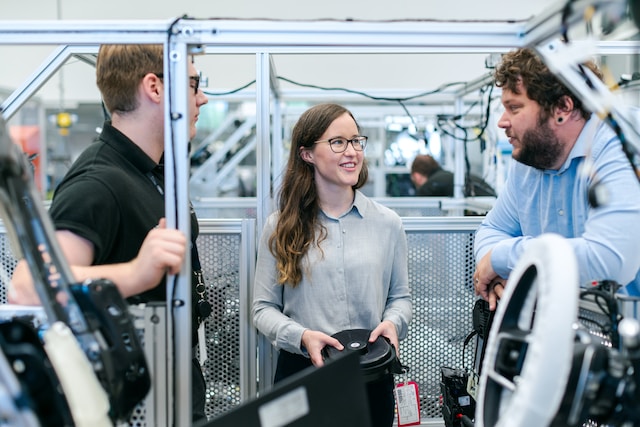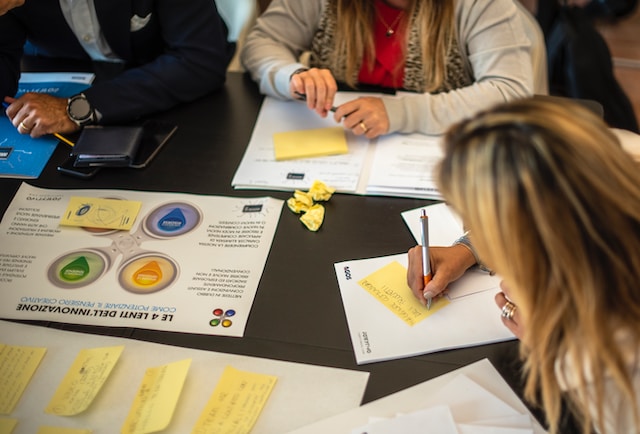The AI adoption rate in product development businesses worldwide is expected to reach 67% by 2025.
64% of businesses expect AI to increase productivity.
ISO has already developed a standard for responsible use of AI in business.
Align the use of AI with your business capabilities
Becoming an AI powerhouse isn't primarily about maximizing the use of AI. It's about integrating it strategically to strengthen your organization's capabilities.
Whether you're just beginning, aiming to stay ahead, or have a specific use case in mind, there are several approaches you can take. And our expert consultants are here to help you on your way.
Align the use of AI with your business capabilities
Becoming an AI powerhouse isn't primarily about maximizing the use of AI. It's about integrating it strategically to strengthen your organization's capabilities.
Whether you're just beginning, aiming to stay ahead, or have a specific use case in mind, there are several approaches you can take. And our expert consultants are here to help you on your way.
Any of the following can be your starting or acceleration point. All approaches ultimately come together to form your AI powerhouse.
AI implementation should align with your organization's overall strategy, ensuring your AI initiatives contribute to broader goals. A strategy serves as a comprehensive guide, overarching various aspects of your project. This provides clarity, ensures resource efficiency, minimizes risks and promotes sustainable value creation.
Business capabilities can be improved tremendously through the use of AI. Prime examples are customer service and internal processes and workflows. AI-supported capabilities can be applied across multiple domains such as products and production. This systematic approach ensures that AI implementation is targeted and meaningful, enhancing areas where it can deliver the most value.
Assess whether your organization is AI-ready, focusing on existing resources and capabilities. AI-readiness hinges on an organization's ability to use artificial intelligence successfully and effectively. Central to this preparedness is the pivotal role of data — its quality, accessibility, and strategic use form the foundation for optimal AI integration, ensuring the organization is primed for success in the AI landscape.

When a company uses AI, it involves people interacting with it. People often have mixed feelings about new technologies, either thinking too highly or too little of them, and they tend to avoid things they don't get. So, organizations should build a culture that welcomes AI but also knows its limits, using it smartly as a tool. Just because you have a hammer doesn't mean everything is a nail!
Employees should be taught how to use AI properly for specific jobs and in a safe way. It's important to have rules in place (AI governance) to guide if problems come up because of decisions made by AI.

For AI to work well, it needs good data. If the data isn't good, even the smartest AI won't be useful. Also, AI can't do much if there's nothing to analyze or if the information isn't in a form it can understand. So, companies should think of data as a valuable resource, just like oil, because it creates value.

What kinds of AI technologies are out there? About 70% of them now have fancy labels like "powered by AI" or "AI inside." Companies should know how the technologies they want to use work, especially for important tasks, and keep an eye on how these technologies are improving. Connecting AI technologies to a company's current systems might mean creating new ways for them to communicate.

Processes should be designed to leverage AI effectively, particularly in routine tasks that heavily rely on digital data. The goal is to strategically integrate AI where it can enhance efficiency in everyday tasks that require substantial information processing.

Incorporating AI may face external challenges if specific laws restrict its usage. Organizations need to be aware of and familiar with legal obligations and comprehend the technologies they employ, evaluating whether there might be compliance concerns. It involves navigating the legal landscape to ensure that the integration of AI aligns with established regulations and minimizes any potential legal risks.
Leveraging our substantial and extensive track record in the development and implementation of AI-enhanced software, we stand as expert consultants poised to enhance your business capabilities. Partnering with us ensures tailored guidance and optimization of your AI initiatives, translating into tangible benefits for your organization.
Learn more about our AI initiatives →
Strategic Service Consulting GmbH is the consulting subsidiary of Serviceware SE and is headquartered in Berlin, Germany. Strategic Service Consulting specializes in crafting strategic concepts with a focus on practical feasibility. The process is initiated by formulating the strategy and scrutinizing business processes, ultimately designing the optimal service workflow tailored to your company. The approach seamlessly integrates the benefits of traditional strategy and IT consulting. More about Strategic Service Consulting →
Gather your team and stakeholders for a half-day workshop to define your approach. Unlock the transformative potential of AI for your business success, customized to suit your organizational goals.
Get in touch to discuss your plans and ideas and we'll find a date to meet.